Complete Solutions to Problem For Practice of chapter ORGANIC CHEMISTRY-SOME BASIC PRINCIPLES TECHNIQUES of Class 11 book with complete answers and questions
| Class 11 | CHEMISTRY |
| Chapter | ORGANIC CHEMISTRY-SOME BASIC PRINCIPLES TECHNIQUES |
| PRADEEP | Problem For Practice |
| Number Of Questions | 27 |
| Academic Year | 2023-24 |
Give the IUPAC name of the following alkanes:


View SolutionWhat is wrong with the following names ? Draw the structures they represent and give their correct name
(i) 1, 1-Dimethylpentane (ii) 2-Methyl-2-propylhexane (iii) 3,4-Dimethylpentane
(iv) 4, 4-Dimethyl-3-ethylpentane (v) 4-(2-Methylethyl)heptane
View SolutionGive the IUPAC names of the following compounds :
(i) `{:(" "CH_(3)" "CH_(3)),(" |"" |"),(CH_(3)CH_(2)CH_(2)-C-CH_(2)-C=CH_(2)),(" |"),(" "C_(2)H_(5)):}` (ii) `{:(" "CH_(3)),(" |"),(CH_(3)-CH-C-=CH):}` (iii) `C_(6)H_(5)-CH=CH-CH_(2)Cl`
(iv) `CH_(3)CH=CH-CH_(2)Br`
(v) `{:(" "Cl),(" | "),(CH_(2)=C-CH=CH_(2)):}`
(vi) `{:(" "CH_(2)CH_(3)),(" |"),(CH_(2)=CH-CH-C=CH_(2)),(" |"),(" "Cl):}` (vii)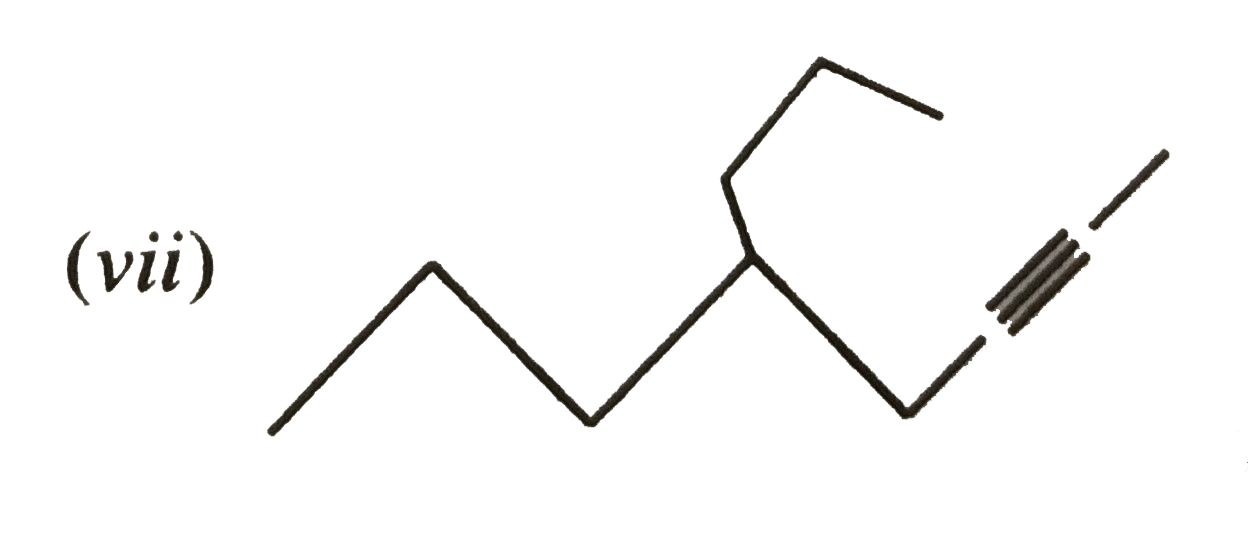
View SolutionGive the condensed and bond-line structural formulae for the following :
(a) 2-Methylbuta-1, 3-diene
(b) Penta-1, 4-diene
(c) Hexa-1, 3, 5-triene
(d) 3-Ethylpenta-1, 3-diene
View SolutionGive the IUPAC name of the following compounds :
(i) `{:(C_(2)H_(5)-C-CH_(2)OH),(" ||"),(" "CH_(2)):}` (ii) `CH_(3)-CH=CH-CHO` (iii)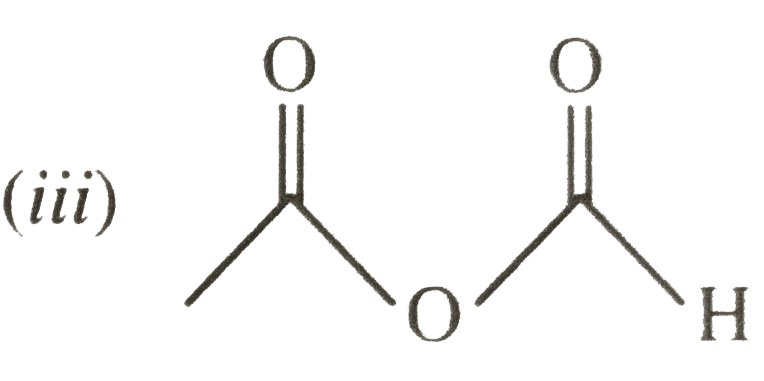
(iv) `CH_(3)-CH=CH-COOH` (v) `(CH_(3))_(2)C = CHCOCH_(3)` (vi) `CH_(2)=CH-CN`
(vii) `OCH - CHO` (viii) `HOOC-C-=-COOH` (ix) `{:(" "CH_(3)),(" |"),(CH_(2)=C-COOCH_(3)):}`
(x) `{:(" "CH_(3)),(" |"),(CH_(3)CH_(2)-C(Cl)-CH_(2)-CONHCH_(2)CH_(3)):}` (xi) `{:(" "OCH_(3)),(" |"),(CH_(3)-CH-CHO):}`
(xii) `[CH_(3))_(2)CH]_(3)COH`
(xiii) `{:(CH_(3)CH_(2)CHCH_(2)CHO),(" |"),(" "CH_(3)):}` (xiv) `{:(CH_(3)CHCH_(2)CH_(3)),(" |"),(" "COOH):}`
(xv) `CH_(3)CH_(2)CHOHCH_(2)CH_(2)CH(CH_(3))CH_(2)CH_(3)`
(xvi) `CH_(3)CH_(2)COCH_(2)COCH_(3)` (xvii)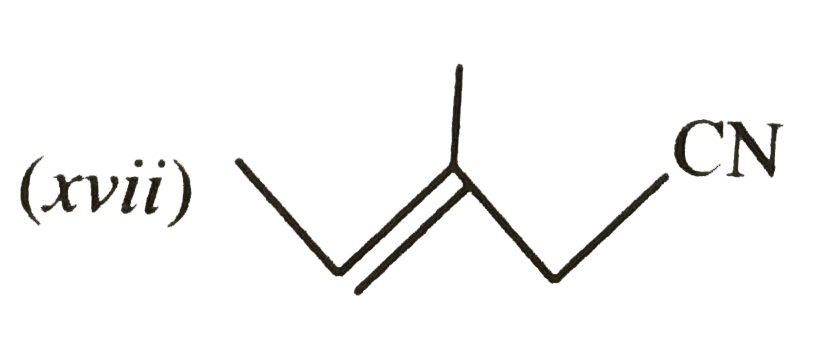 (xviii) `{:(CH_(3)-CH-CH_(2)-CH-CH-CH_(3)),(" |"" |"" |"),(" "CH_(3)" "Br" "OH):}`
(xviii) `{:(CH_(3)-CH-CH_(2)-CH-CH-CH_(3)),(" |"" |"" |"),(" "CH_(3)" "Br" "OH):}`
View SolutionGive the IUPAC names for the following polyfunctional compounds.
(i) `CH_(3)CH_(2)O-CH_(2)-CHOH-CH_(3)` (ii) `{:(" "CH_(3)),(" |"),(CH_(3)-CH-CH_(2)-C-CH_(3)),(" |"" |"),(" "NO_(2)" "OH):}`
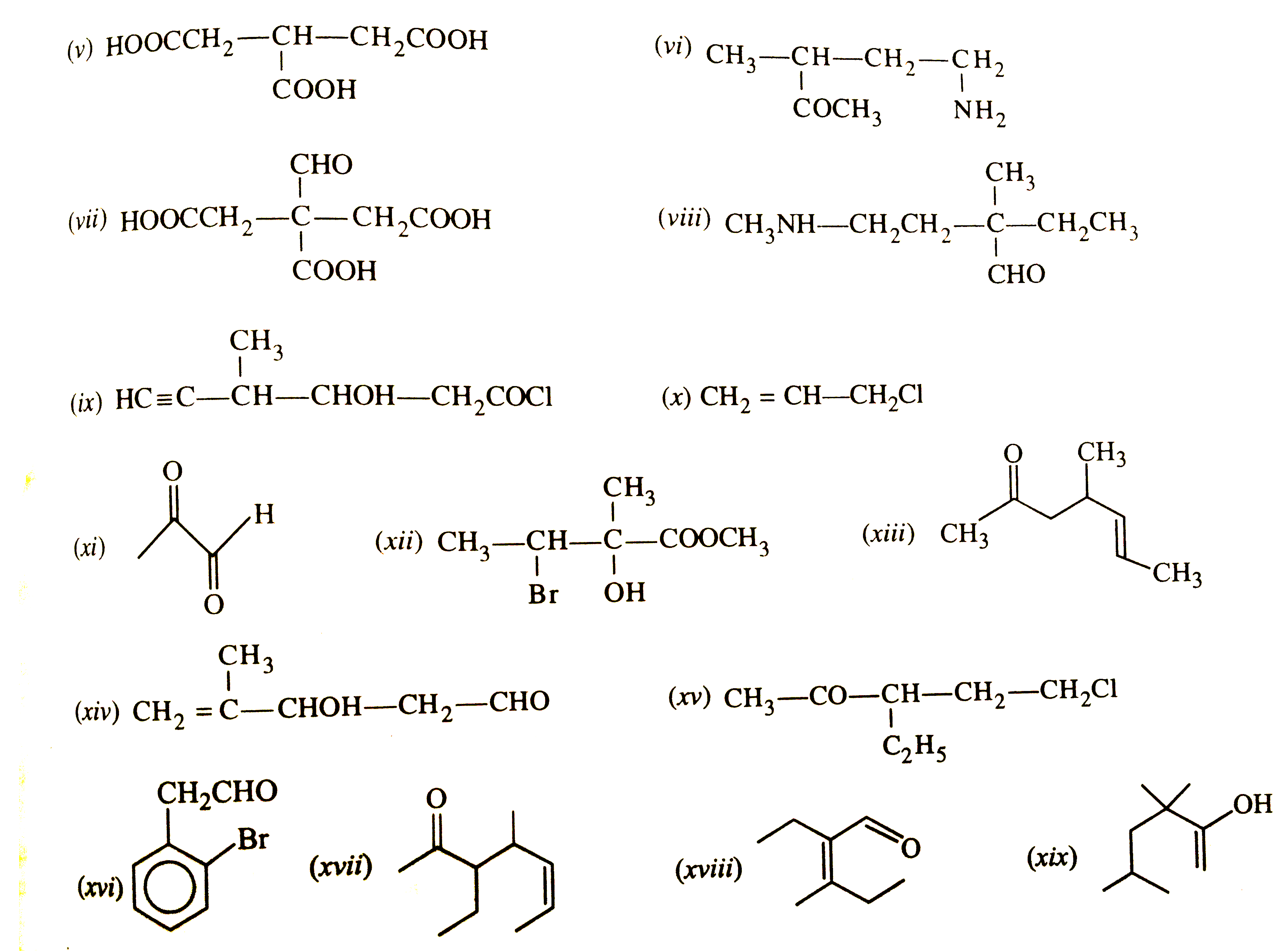
View SolutionGive the IUPAC name the following compounds :
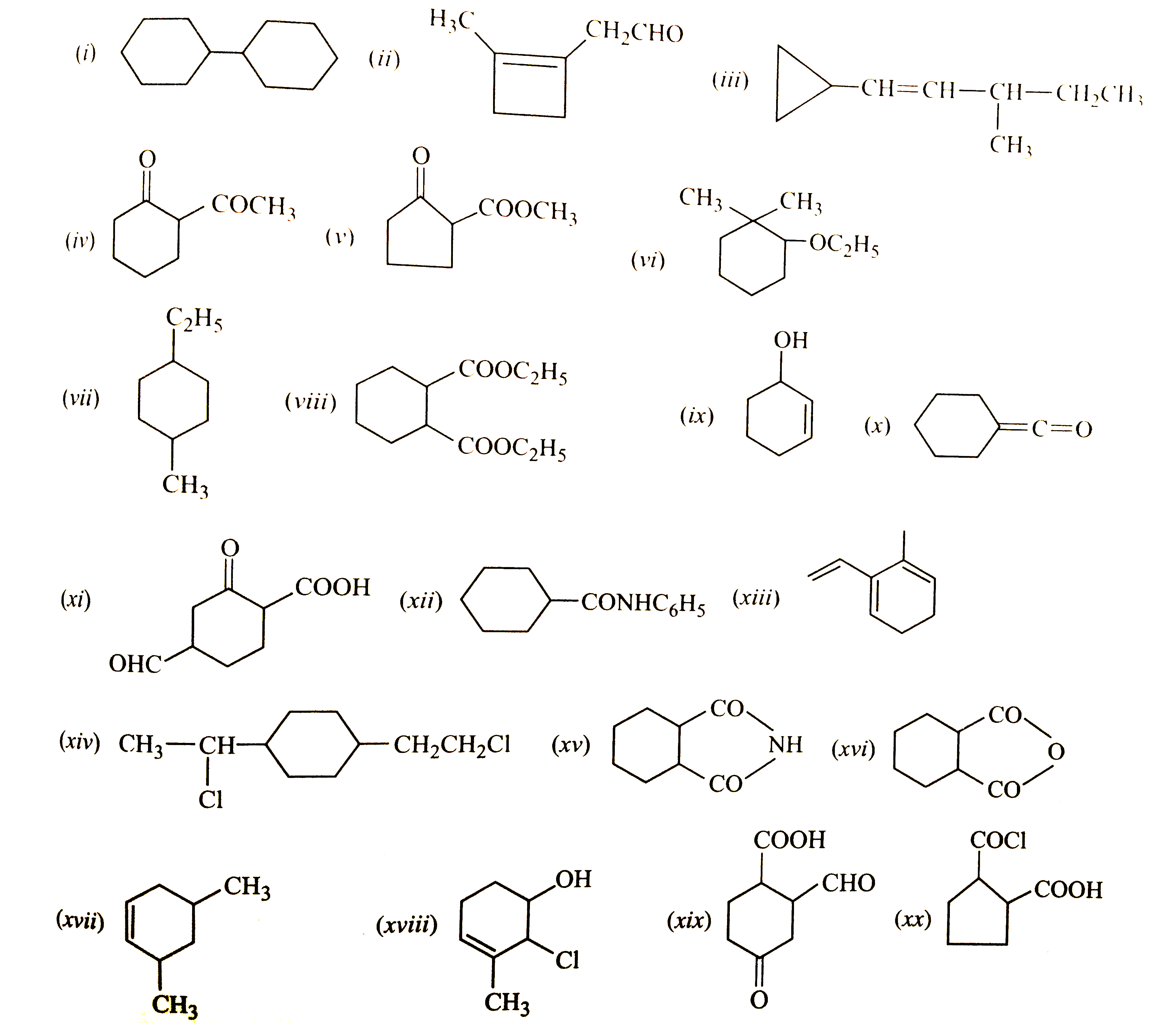
View SolutionDraw the structures of the following compounds :
(i) Hex-3-en-1-oic acid (ii) 2-Chloro-2-methylbutane-1-ol (iii) 5, 5-Diethylnonan-3-ol
(iv) 1-Bromo-3-chlorocyclohex-1-ene (v) 1, 3-Dimethylcyclohex-1-ene
View SolutionWrite the condensed formulae for each of the following compounds :
(i) Isopropyl alcohol
(ii) Methyl t-butyl ether
(iii) 2-Chloro-1, 1, 1-trifluoroethane
(iv) 2-Methylbuta-1, 3-diene
(v) But-2-en-1-ol
View SolutionDraw structures of all isomeric ethers corresponding to molecular formula `C_5 H_12 O`.
View SolutionWrite condensed and bond line structural formulae for all the possible isomers of molecular formula `C_(4)H_(6)`.
View SolutionDraw the polygon formulae for all the possible structural isomers having the molecular formula `C_(5)H_(10)`.
View Solution0.6723 g of an organic compound gave on combustion 1.530 g of carbon dioxide and 0.625g of water. Find the percentage of carbon and hydrogen in the compound.
View Solution0.465 g of an organic substance gave on combustion 1.32 g of `CO_(2)` and 0.315g of `H_(2)O`. Calculate the percentage of carbon and hydrogen in the compound.
View Solution0.2475 gm of an organic substance gave on combustion 0.495 gm of `CO_2` and `0.2025gm` of `H_2O`. Calculate the percentange of carbon and hydrogen in it.
View Solution0.2046 g of an organic compound gave 30.4 mL of moist nitrogen measured at 288 K and 732.7 mm pressure. Calculate the percentage of nitrogen in the substance (Aqueous tension at 288 K is 12.7 mm).
View Solution0.27g of an organic compound gave on combustion 0.396 of `CO_(2)` 0.216g of `H_(2)O` 0.36g of the same substance gave 48.88 ml of `N_(2)` at 290K and 740mm pressure Calculate the percentage composition of the compound.
View Solution0.2g of an organic compound of kjedahl's analysis gave enough ammonia to just neutralise 20ml of 0.1 `N H_(2)SO_(4)` Calculate the % of nitrogen in the compound.
View Solution0.4422g of an organic compound was Kjeldahlised and ammonia evolved was absorbed in 50 mL of semi-molar (0.5 M) `H_(2)SO_(4)`. The residual acid required 131 mL of 0.25 M NaOH. Determine the percentange of nitrogen in the compound.
View SolutionAmmonia obtained from 0.4 g of organic substance by Kjeldahl's method was absorbed in 30 mL of 0.25M `H_(2)SO_(4)`. The excess of the acid was neutralized by the addition of 30 mL of 0.2 M NaOH. Calculate the percentage of nitrogen in the substance.
View SolutionIf 0.189 g of a chlorine containing organic compound gave 0.287 g of silver chloride, then the percentage of chorine in the organic compound is
View Solution0.301 g of an organic compound gave 0.282 g of silver bromide by a halogen estimation method. Find the percentage of bromine in the compound.
View Solution0.2174 g of the substance gave 0.5825 g of `BaSO_(4)` by Carius method. Calculate the percentage of sulphur.
View Solution0.16 g of an organic substance was heated in carius tube and the sulphuric acid formed was precipitated as `BaSO_(4)` with `BaCl_(2)`. The weight of the dry `BaSO_(4)` was 0.35g Find the % of sulphur
View Solution0.2595 gm of an organic substance when treated by carius method gave 0.35 gm of `BaSO_4`. Calculate the percentage of sulphur in the compound?
View Solution0.092 g of an organic compound containing phosphorus gave 0.111 g `Mg_(2)P_(2)O_(7)` usual analysis Calculate the % of phosphorus in the organic compound.
View Solution0.40g of an organic compound containing phosphorus gave 0.555 g of `Mg_(2)P_(2)O_(7)` by usual analysis calculate the % of phosphorus in the organic compound
View Solution
Problem For Practice questions and complete solutions for chapter ORGANIC CHEMISTRY-SOME BASIC PRINCIPLES TECHNIQUES of PRADEEP CHEMISTRY (HINGLISH) of Class 11
All Exercises from PRADEEP Class 11 CHEMISTRY ORGANIC CHEMISTRY-SOME BASIC PRINCIPLES TECHNIQUES
- Additional Questions (Long Answer Type Questions)
- Additional Questions (Short Answer Questions)
- Additional Questions (Very short Answer Questions)
- Analytical Questions and Problems with Answers/Solutions (Problems)
- Analytical Questions and Problems with Answers/Solutions (Questions)
- Competition Focus (Jee (Main and Advanced)/Medical Entrance) II. Multiple Choice Questions (with one or more than one correct answers)
- Competition Focus (Jee (Main and Advanced)/Medical Entrance) III. Multiple Choice Questions (Comprehension)
- Competition Focus (Jee (Main and Advanced)/Medical Entrance) I. Multiple choice Questions (With One Correct Answer)
- Competition Focus (Jee (Main and Advanced)/Medical Entrance) IV. Matching Type Questions
- Competition Focus (Jee (Main and Advanced)/Medical Entrance) V. Matrix-Match Type Questions
- Competition Focus (Jee (Main and Advanced)/Medical Entrance) VI. Integer Type Questions
- Competition Focus (Jee (Main and Advanced)/Medical Entrance) VII. Numerical Values Type Questions
- Competition Focus (Jee (Main and Advanced)/Medical Entrance) VIII. Assertion-Reason Type Questions
- Conceptual Questions (I. Hybridization Classification and Nomenclature)
- Conceptual Questions (II. Isomerism)
- Conceptual Questions (III. Fundamental Concepts of Organic Reaction Mechanism)
- Conceptual Questions (IV. Purification and Separation of Organic Compounds)
- Curiosity Questions
- NCERT EXEMPLAR PROBLEMS WITH ANSWERS, HINTS AND SOLUTIONS (Assertion and Reason Type Questions)
- NCERT EXEMPLAR PROBLEMS WITH ANSWERS, HINTS AND SOLUTIONS (Long Answer Type Questions)
- NCERT EXEMPLAR PROBLEMS WITH ANSWERS, HINTS AND SOLUTIONS (Matching Type Questions)
- NCERT EXEMPLAR PROBLEMS WITH ANSWERS, HINTS AND SOLUTIONS (Multiple Choice Questions - I)
- NCERT EXEMPLAR PROBLEMS WITH ANSWERS, HINTS AND SOLUTIONS (Multiple Choice Questions - II)
- NCERT EXEMPLAR PROBLEMS WITH ANSWERS, HINTS AND SOLUTIONS (Short Answer Questions)
- NCERT Questions and Exercises With Answers
- Problem For Practice
- Solved Problem
- Test Your Grip (I. Multiple Choice Questions)
- Test Your Grip (II. Fill in the Blanks)
- Test Your Grip (Multiple Choice Questions)